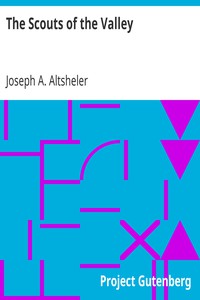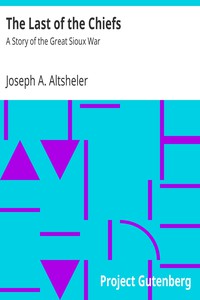The Scouts of the Valley by Joseph A. Altsheler (snow like ashes series .TXT) 📗

- Author: Joseph A. Altsheler
Book online «The Scouts of the Valley by Joseph A. Altsheler (snow like ashes series .TXT) 📗». Author Joseph A. Altsheler
Henry was conscious that he was very weak, but he seemed to have regained much of his lost will. He looked once more at the fatal left ankle. It had improved greatly. He could even stand upon it, but when he rose to his feet he felt a singular dizziness. Again, what he had gained in one way he had lost in another. The earth wavered. The smooth surface of the lake seemed to rise swiftly, and then to sink as swiftly. The far slope down which he had shot rose to the height of miles. There was a pale tinge, too, over the world. He sank down, not because of his ankle, but because he was afraid his dizzy head would make him fall.
The power of will slipped away again for a minute or two. He was ashamed of such extraordinary weakness. He looked at one of his hands. It was thin, like the band of a man wasted with fever, and the blue veins stood out on the back of it. He could scarcely believe that the hand was his own. But after the first spasm of weakness was over, the precious will returned. He could walk. Strength enough to permit him to hobble along had returned to the ankle at last, and mind must control the rest of his nervous system, however weakened it might be. He must seek food.
He withdrew into the farthest recess of his covert, wrapped the blanket tightly about his body, and lay still for a long time. He was preparing both mind and body for the supreme effort. He knew that everything hung now on the surviving remnants of his skill and courage.
Weakened by shock and several days of fasting, he had no great reserve now except the mental, and he used that to the utmost. It was proof of his youthful greatness that it stood the last test. As he lay there, the final ounce of will and courage came. Strength which was of the mind rather than of the body flowed back into his veins; he felt able to dare and to do; the pale aspect of the world went away, and once more he was Henry Ware, alert, skillful, and always triumphant.
Then he rose again, folded the blanket, and fastened it on his shoulders. He looked at the snowshoes, but decided that his left ankle, despite its great improvement, would not stand the strain. He must break his way through the snow, which was a full three feet in depth. Fortunately the crust had softened somewhat in the last two or three days, and he did not have a covering of ice to meet.
He pushed his way for the first time from the lair under the cliff, his rifle held in his ready hands, in order that he might miss no chance at game. To an ordinary observer there would have been no such chance at all. It was merely a grim white wilderness that might have been without anything living from the beginning. But Henry, the forest runner, knew better. Somewhere in the snow were lairs much like the one that he had left, and in these lairs were wild animals. To any such wild animal, whether panther or bear, the hunter would now have been a fearsome object, with his hollow cheeks, his sunken fiery eyes, and his thin lips opening now and then, and disclosing the two rows of strong white teeth.
Henry advanced about a rod, and then he stopped, breathing hard, because it was desperate work for one in his condition to break his way through snow so deep. But his ankle stood the strain well, and his courage increased rather than diminished. He was no longer a cripple confined to one spot. While he stood resting, he noticed a clump of bushes about half a rod to his left, and a hopeful idea came to him.
He broke his way slowly to the bushes, and then he searched carefully among them. The snow was not nearly so thick there, and under the thickest clump, where the shelter was best, he saw a small round opening. In an instant all his old vigorous life, all the abounding hope which was such a strong characteristic of his nature, came back to him. Already he had triumphed over Indians, Tories, the mighty slope, snow, ice, crippling, and starvation.
He laid the rifle on the snow and took the ramrod in his right hand. He thrust his left hand into the hole, and when the rabbit leaped for life from his warm nest a smart blow of the ramrod stretched him dead at the feet of the hunter. Henry picked up the rabbit. It was large and yet fat. Here was food for two meals. In the race between the ankle and starvation, the ankle had won.
He did not give way to any unseemly elation. He even felt a momentary sorrow that a life must perish to save his own, because all these wild things were his kindred now. He returned by the path that he had broken, kindled his fire anew, dexterously skinned and cleaned his rabbit, then cooked it and ate half, although he ate slowly and with intervals between each piece. How delicious it tasted, and how his physical being longed to leap upon it and devour it, but the power of the mind was still supreme. He knew what was good for himself, and he did it. Everything was done in order and with sobriety. Then he put the rest of the rabbit carefully in his food pouch, wrapped the blanket about his body, leaned back, and stretched his feet to the coals.
What an extraordinary change had come over the world in an hour! He had not noticed before the great beauty of the lake, the lofty cliffs on the farther shore, and the forest clothed in white and hanging with icicles.
The winter sunshine was molten silver, pouring down in a flood.
It was not will now, but actuality, that made him feel the strength returning to his frame. He knew that the blood in his veins had begun to sparkle, and that his vitality was rising fast. He could have gone to sleep peacefully, but instead he went forth and hunted again. He knew that where the rabbit had been, others were likely to be near, and before he returned he had secured two more. Both of these he cleaned and cooked at once. When this was done night had come, but he ate again, and then, securing all his treasures about him, fell into the best sleep that he had enjoyed since his flight.
He felt very strong the next morning, and he might have started then, but he was prudent. There was still a chance of meeting the Iroquois, and the ankle might not stand so severe a test. He would rest in his nest for another day, and then he would be equal to anything. Few could lie a whole day in one place with but little to do and with nothing passing before the eyes, but it was a part of Henry's wilderness training, and he showed all the patience of the forester. He knew, too, as the hours went by, that his strength was rising all the while. To-morrow almost the last soreness would be gone from his ankle and then he could glide swiftly over the snow, back to his comrades. He was content. He had, in fact, a sense of great triumph because he had overcome so much, and here was new food in this example for future efforts of the mind, for future victories of the





Comments (0)